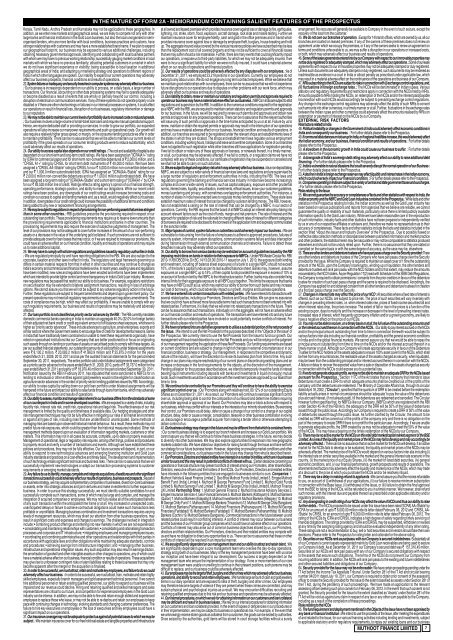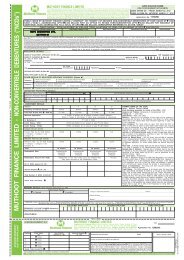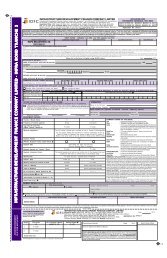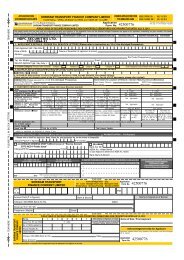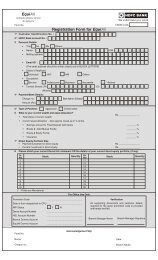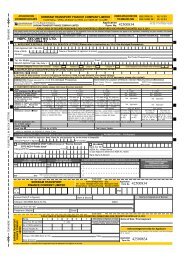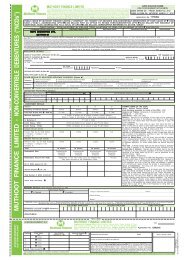NON-CONVERTIBLE
MUTHOOT FINANCE LIMITED - HDFC Bank
MUTHOOT FINANCE LIMITED - HDFC Bank
- No tags were found...
You also want an ePaper? Increase the reach of your titles
YUMPU automatically turns print PDFs into web optimized ePapers that Google loves.
7<br />
IN THE NATURE OF FORM 2A - MEMORANDUM CONTAINING SALIENT FEATURES OF THE PROSPECTUS<br />
MUTHOOT FINANCE LIMITED<br />
Kerala, Tamil Nadu, Andhra Pradesh and Karnataka may not be applicable to these geographies. In<br />
addition, as we enter new markets and geographical areas, we are likely to compete not only with other<br />
large banks and financial institutions in the Gold Loan business, but also the local unorganised or semiorganised<br />
lenders, who are more familiar with local conditions, business practices and customs, have<br />
stronger relationships with customers and may have a more established brand name. If we plan to expand<br />
our geographical footprint, our business may be exposed to various additional challenges, including<br />
obtaining necessary governmental approvals, identifying and collaborating with local business partners<br />
with whom we may have no previous working relationship; successfully gauging market conditions in local<br />
markets with which we have no previous familiarity; attracting potential customers in a market in which<br />
we do not have significant experience or visibility; being susceptible to local taxation in additional<br />
geographical areas of India; and adapting our marketing strategy and operations to different regions of<br />
India in which other languages are spoken. Our inability to expand our current operations may adversely<br />
affect our business prospects, financial conditions and results of operations.<br />
22. System failures or inadequacy and security breaches in computer systems may adversely affect our business.<br />
: Our business is increasingly dependent on our ability to process, on a daily basis, a large number of<br />
transactions. Our financial, accounting or other data processing systems may fail to operate adequately<br />
or become disabled as a result of events that are wholly or partially beyond our control, including a<br />
disruption of electrical or communications services. If any of these systems do not operate properly or are<br />
disabled or if there are other shortcomings or failures in our internal processes or systems, it could affect<br />
our operations or result in financial loss, disruption of our businesses, regulatory intervention or damage<br />
to our reputation.<br />
23. We may not be able to maintain our current levels of profitability due to increased costs or reduced spreads.<br />
: Our business involves a large volume of small-ticket size loans and requires manual operational support.<br />
Hence, we require dedicated staff or providing our services. In order to grow our portfolio, our expanded<br />
operations will also increase our manpower requirements and push up operational costs. Our growth will<br />
also require a relatively higher gross spread, or margin, on the consumer lending products we offer in order<br />
to maintain profitability. There can be no assurance that we will be able to maintain our current levels of<br />
profitability if the gross spreads on our consumer lending products were to reduce substantially, which<br />
could adversely affect our results of operations.<br />
24. Our ability to access capital also depends on our credit ratings. : The cost and availability of capital is also<br />
dependent on our short-term and long-term credit ratings. We have been assigned an ”[ICRA]A1+” rating<br />
by ICRA for commercial paper and for short-term non-convertible debentures of ` 2,000.0 million, and a<br />
“CRISIL A1+” rating by CRISIL for short term debt instruments of ` 40,000.0 million. We have been<br />
assigned a “CRISIL AA-/Stable” rating by CRISIL for our ` 5,000.0 million non-convertible debentures<br />
and our ` 1,000.0 million subordinated debt. ICRA has assigned an ”[ICRA]AA-/Stable” rating for our<br />
` 2,000.0 million non-convertible debentures and our ` 1,000.0 million subordinated debt. We have<br />
been assigned a long-term rating of “[ICRA]AA-/Stable” and a short-term rating of “[ICRA]A1+” by ICRA<br />
for our ` 93,530 million line of credit. Ratings reflect a rating agency’s opinion of our financial strength,<br />
operating performance, strategic position, and ability to meet our obligations. While our recent credit<br />
ratings have been positive, any downgrade of our credit ratings would increase borrowing costs and<br />
constrain our access to capital and lending markets and, as a result, would negatively affect our business.<br />
In addition, downgrades of our credit ratings could increase the possibility of additional terms and conditions<br />
being added to any new or replacement financing arrangements.<br />
25. We may be subject to regulations in respect of provisioning for non-performing assets that are less stringent<br />
than in some other countries. : RBI guidelines prescribe the provisioning required in respect of our<br />
outstanding loan portfolio. These provisioning requirements may require us to reserve lower amounts than<br />
the provisioning requirements applicable to financial institutions and banks in other countries. The<br />
provisioning requirements may also require the exercise of subjective judgments of management. The<br />
level of our provisions may not be adequate to cover further increases in the amount of our non-performing<br />
assets or a decrease in the value of the underlying gold collateral. If such provisions are not sufficient to<br />
provide adequate cover for loan losses that may occur, or if we are required to increase our provisions, this<br />
could have an adverse effect on our financial condition, liquidity and results of operations and may require<br />
us to raise additional capital.<br />
26. We may have to comply with stricter regulations and guidelines issued by regulatory authorities in India.<br />
: We are regulated principally by and have reporting obligations to the RBI. We are also subject to the<br />
corporate, taxation and other laws in effect in India. The regulatory and legal framework governing us<br />
differs in certain material respects from that in effect in other countries and may continue to change as<br />
India’s economy and commercial and financial markets evolve. In recent years, existing rules and regulations<br />
have been modified, new rules and regulations have been enacted and reforms have been implemented<br />
which are intended to provide tighter control and more transparency in India’s Gold Loan industry. Moreover,<br />
new regulations may be passed that restrict our ability to do business. For example, regulatory restrictions<br />
on securitisation may be extended to bilateral assignment transactions, resulting in loss of arbitrage<br />
options. We cannot assure you that we will not be subject to any adverse regulatory action in the future.<br />
Further, these regulations are subject to frequent amendments and depend upon government policy. Our<br />
present operations may not meet all regulatory requirements or subsequent regulatory amendments. The<br />
costs of compliance may be high, which may affect our profitability. If we are unable to comply with any<br />
such regulatory requirements, our business and results of operations may be materially and adversely<br />
affected.<br />
27. Our loan portfolio is not classified as priority sector advances by the RBI. : The RBI currently mandates<br />
domestic commercial banks operating in India to maintain an aggregate 40.0% (32.0% for foreign banks)<br />
of their adjusted net bank credit or credit equivalent amount of off-balance sheet exposure, whichever is<br />
higher as “priority sector advances”. These include advances to agriculture, small enterprises, exports and<br />
similar sectors where the Government seeks to encourage flow of credit for developmental reasons. Banks<br />
in India that have traditionally been constrained or unable to meet these requirements organically, have<br />
relied on specialised institutions like our Company that are better positioned to or focus on originating<br />
such assets through on-lending or purchase of assets or securitised pools to comply with these targets. As<br />
per our audited financial statements, our outstanding amounts of sold portfolio under bilateral assignments<br />
were ` 8,130.2 million, ` 20,083.2 million,` 41,863.9 million and ` 25,875.0 million for the years<br />
ended March 31, 2009, 2010, 2011 and as per the audited financial statements for the period ended<br />
September 30, 2011, respectively. The entire portfolio sold under bilateral assignments were categorised<br />
as a priority sector advance for the years ended March 31, 2009, 2010, partly of ` 33,737.0 million for the<br />
year ended March 31,2011 and partly of ` 18,970.40 million for the period ended September 30, 2011.<br />
Notification issued by the RBI in February 2011, has stipulated that loans sanctioned to NBFCs for on<br />
lending to individuals or other entities against gold jewellery would not be eligible for classification as<br />
agriculture sector advances in the context of priority sector lending guidelines issued by RBI. Accordingly,<br />
our ability to raise capital by selling down our gold loan portfolio under bilateral assignments will be<br />
hampered in the future and impact our ability to raise funds through loans from banks, which may adversely<br />
affect our financial condition and results of operations.<br />
28. Our ability to assess, monitor and manage risks inherent in our business differs from the standards of some<br />
of our counterparts in India and in some developed countries. : We are exposed to a variety of risks, including<br />
liquidity risk, interest rate risk, credit risk, operational risk and legal risk. The effectiveness of our risk<br />
management is limited by the quality and timeliness of available data. Our hedging strategies and other<br />
risk management techniques may not be fully effective in mitigating our risks in all market environments<br />
or against all types of risk, including risks that are unidentified or unanticipated. Some methods of<br />
managing risks are based upon observed historical market behaviour. As a result, these methods may not<br />
predict future risk exposures, which could be greater than the historical measures indicated. Other risk<br />
management methods depend upon an evaluation of information regarding markets, customers or other<br />
matters. This information may not in all cases be accurate, complete, up-to-date or properly evaluated.<br />
Management of operational, legal or regulatory risk requires, among other things, policies and procedures<br />
to properly record and verify a number of transactions and events. Although we have established these<br />
policies and procedures, they may not be fully effective. Our future success will depend, in part, on our<br />
ability to respond to new technological advances and emerging financing institution and Gold Loan<br />
industry standards and practices on a cost-effective and timely basis. The development and implementation<br />
of such technology entails significant technical and business risks. There can be no assurance that we will<br />
successfully implement new technologies or adapt our transaction-processing systems to customer<br />
requirements or emerging market standards.<br />
29. Any failure by us to identify, manage, complete and integrate acquisitions, divestitures and other significant<br />
transactions successfully could adversely affect our results of operations, business and prospects. : As part of<br />
our business strategy, we may acquire complementary companies or businesses, divest non-core businesses<br />
or assets, enter into strategic alliances and joint ventures and make investments to further expand our<br />
business. In order to pursue this strategy successfully, we must identify suitable candidates for and<br />
successfully complete such transactions, some of which may be large and complex, and manage the<br />
integration of acquired companies or employees. We may not fully realise all of the anticipated benefits<br />
of any such transaction within the anticipated time frame or at all. Any increased or unexpected costs,<br />
unanticipated delays or failure to achieve contractual obligations could make such transactions less<br />
profitable or unprofitable. Managing business combination and investment transactions requires varying<br />
levels of management resources, which may divert our attention from other business operations, may<br />
result in significant costs and expenses and charges to earnings. The challenges involved in integration<br />
include: • combining product offerings and entering into new markets in which we are not experienced;<br />
• consolidating and maintaining relationships with customers; • consolidating and rationalising transaction<br />
processes and corporate and IT infrastructure; • integrating employees and managing employee issues;<br />
• coordinating and combining administrative and other operations and relationships with third parties in<br />
accordance with applicable laws and other obligations while maintaining adequate standards, controls<br />
and procedures; • achieving savings from infrastructure integration; and • managing other business,<br />
infrastructure and operational integration issues. Any such acquisition may also result in earnings dilution,<br />
the amortisation of goodwill and other intangible assets or other charges to operations, any of which could<br />
have a material adverse effect on our business, financial condition or results of operations. These acquisitions<br />
may give rise to unforeseen contingent risks or latent liabilities relating to these businesses that may only<br />
become apparent after the merger or the acquisition is finalised.<br />
30. In order to be successful, we must attract, retain and motivate key employees, and failure to do so could<br />
adversely affect our business. : In order to be successful, we must attract, train, motivate and retain highly<br />
skilled employees, especially branch managers and gold assessment technical personnel. If we cannot<br />
hire additional personnel or retain existing qualified personnel, our ability to expand our business will be<br />
impaired and our revenue could decline. Hiring and retaining qualified and skilled managers and sales<br />
representatives are critical to our future, and competition for experienced employees in the Gold Loan<br />
industry can be intense. In addition, we may not be able to hire and retain enough skilled and experienced<br />
employees to replace those who leave, or may not be able to re-deploy and retain our employees to keep<br />
pace with continuing changes in technology, evolving standards and changing customer preferences. The<br />
failure to hire key executives or employees or the loss of executives and key employees could have a<br />
significant impact on our operations.<br />
31. Our insurance coverage may not be adequate to protect us against all potential losses to which we may be<br />
subject. : We maintain insurance cover for our free hold real estate and tangible properties and infrastructure<br />
at all owned and leased premises which provides insurance cover against loss or damage by fire, earthquake,<br />
lightning, riot, strike, storm, flood, explosion, aircraft damage, rock slide and missile testing. Further we<br />
maintain insurance cover for employee fidelity, cash and gold in the office premises and in transit which<br />
provides insurance cover against loss or damage by employee theft, burglary, house breaking and hold<br />
up. The aggregate insured value covered by the various insurance policies we have subscribed may be less<br />
than the replacement cost of all covered property and may not be sufficient to cover all financial losses<br />
that we may suffer should a risk materialise. Further, there are many events that could significantly impact<br />
our operations, or expose us to third-party liabilities, for which we may not be adequately insured. If we<br />
were to incur a significant liability for which we were not fully insured, it could have a material adverse<br />
effect on our results of operations and financial position.<br />
32. Our results of operations could be adversely affected by any disputes with our employees. : As of<br />
December 31, 2011, we employed 23,219 persons in our operations. Currently our employees do not<br />
belong to any labour union. We do not engage any long term contract employees. While we believe that<br />
we maintain good relationships with our employees, there can be no assurance that we will not experience<br />
future disruptions to our operations due to disputes or other problems with our work force, which may<br />
adversely affect our business and results of operations.<br />
33. Our inability to obtain, renew or maintain our statutory and regulatory permits and approvals required to<br />
operate our business may have a material adverse effect on our business. : NBFCs in India are subject to strict<br />
regulations and supervision by the RBI. In addition to the numerous conditions required for the registration<br />
as a NBFC with the RBI, we are required to maintain certain statutory and regulatory permits and approvals<br />
for our business. In the future, we will be required to renew such permits and approvals and obtain new<br />
permits and approvals for any proposed operations. There can be no assurance that the relevant authorities<br />
will issue any of such permits or approvals in the time-frame anticipated by us or at all. Failure by us to<br />
renew, maintain or obtain the required permits or approvals may result in the interruption of our operations<br />
and may have a material adverse effect on our business, financial condition and results of operations. In<br />
addition, our branches are required to be registered under the relevant shops and establishments laws of<br />
the states in which they are located. The shops and establishment laws regulate various employment<br />
conditions, including working hours, holidays and leave and overtime compensation. Some of our branches<br />
have not applied for such registration while other branches still have applications for registration pending.<br />
If we fail to obtain or retain any of these approvals or licenses, or renewals thereof, in a timely manner,<br />
or at all, our business may be adversely affected. If we fail to comply, or a regulator claims we have not<br />
complied, with any of these conditions, our certificate of registration may be suspended or cancelled and<br />
we shall not be able to carry on such activities.<br />
34. We are subject to legal and regulatory risk which may adversely affect our business. : As a non-deposit taking<br />
NBFC, we are subject to a wide variety of financial services laws and regulations and are supervised by<br />
a large number of regulatory and enforcement authorities in India, including the RBI. The laws and<br />
regulations governing the banking and financial services industry in India have become increasingly<br />
complex and cover a wide variety of issues, such as capital adequacy, exposure and other prudential<br />
norms, interest rates, liquidity, securitisation, investments, ethical issues, know-your-customer guidelines,<br />
money laundering and privacy, with sometimes overlapping enforcement authorities. For instance, a<br />
number of states in India have enacted laws to regulate money lending transactions. These state laws<br />
establish maximum rates of interest that can be charged by a person lending money. The RBI, however,<br />
has not established a ceiling on the rate of interest that can be charged by a NBFC in our sector of<br />
operations. Currently, the RBI requires that the board of all NBFCs adopt an interest rate policy taking into<br />
account relevant factors such as the cost of funds, margin and risk premium. The rate of interest and the<br />
approach for gradation of risk and the rationale for charging different rates of interest for different categories<br />
of borrowers are required to be disclosed to the borrowers in the application form and expressly communicated<br />
in the sanction letter.<br />
35. Major lapses of control, system failures or calamities could adversely impact our business. : We are<br />
vulnerable to risks arising from the failure of employees to adhere to approved procedures, failures of<br />
security system, information system disruptions, communication systems failure and data interception<br />
during transmission through external communication channels and networks. Failure to detect these<br />
breaches in security may adversely affect our operations.<br />
36. Our ability to borrow from various banks may be restricted on account of guidelines issued by the RBI<br />
imposing restrictions on banks in relation to their exposure to NBFCs. : Under RBI Master Circular No. RBI/<br />
2010-11/68 DBOD No.Dir.BC.14/13.03.00/ 2010-11 issued on July 1, 2010, the exposure (both lending<br />
and investment, including off balance sheet exposures) of a bank to a single NBFC should not exceed<br />
10%, of the bank’s capital funds as per its last audited balance sheet. Banks may, however, assume<br />
exposures on a single NBFC up to 15%, of their capital funds provided the exposure in excess of 10% is<br />
on account of funds on-lent by the NBFC to the infrastructure sector. Further, banks may also consider fixing<br />
internal limits for their aggregate exposure to all NBFCs put together. This limits the exposure that banks<br />
may have on NBFCs such as us, which may restrict our ability to borrow from such banks and may increase<br />
our cost of borrowing, which could adversely impact our growth, margins and business operations.<br />
37. We have entered into certain transactions with related parties. : We have entered into transactions with<br />
several related parties, including our Promoters, Directors and Group Entities. We can give no assurance<br />
that we could not have achieved more favourable terms had such transactions not been entered into with<br />
related parties. Furthermore, it is likely that we will enter into related party transactions in the future. There<br />
can be no assurance that such transactions, individually or in the aggregate, will not have an adverse effect<br />
on our financial condition and results of operations. The transactions we have entered into and any future<br />
transactions with our related parties have involved or could potentially involve conflicts of interest. For<br />
further details please refer to the Prospectus.<br />
38. We have not entered into any definitive agreements to utilise a substantial portion of the net proceeds of<br />
the Issue. : We intend to use the Net Proceeds for the purposes described in the “Objects of the Issue” of<br />
the Prospectus. We currently intend to use the Net Proceeds from the Issue to fund our growth. Our<br />
management will have broad discretion to use the Net Proceeds and you will be relying on the judgment<br />
of our management regarding the application of these Net Proceeds. Our funding requirements are based<br />
on current conditions and are subject to change in light of changes in external circumstances or in our<br />
financial condition, business or strategy. Our management, in response to the competitive and dynamic<br />
nature of the industry, will have the discretion to revise its business plan from time to time. Any such<br />
change in our plans may require rescheduling of our current plans or discontinuing existing plans and an<br />
increase or decrease in the fund requirements for the objects, at the discretion of the management.<br />
Pending utilisation for the purposes described above, we intend to temporarily invest the funds in interest<br />
bearing liquid instruments including deposits with banks and investments in liquid (not equity) mutual<br />
funds. Such investments would be in accordance with the investment policies approved by our Board from<br />
time to time.<br />
39. We continue to be controlled by our Promoters and they will continue to have the ability to exercise<br />
significant control over us. : Our Promoters along with relatives hold, 80.12% of our outstanding Equity<br />
Shares as on December 31, 2011. As a result, our Promoters will continue to exercise significant control<br />
over us, including being able to control the composition of our Board and determine matters requiring<br />
shareholder approval or approval of our Board. Our Promoters may take or block actions with respect to<br />
our business, which may conflict with our interests or the interests of our minority shareholders. By exercising<br />
their control, our Promoters could delay, defer or cause a change of our control or a change in our capital<br />
structure, delay, defer or cause a merger, consolidation, takeover or other business combination involving<br />
us, discourage or encourage a potential acquirer from making a tender offer or otherwise attempting to<br />
obtain control of us.<br />
40. Our business strategy may change in the future and may be different from that which is contained herein.<br />
: Our current business strategy is to expand our branch network and increase our Gold Loan portfolio. We<br />
cannot assure you that we will continue to follow these business strategies. In the future, we may decide<br />
to diversify into other businesses. We may also explore opportunities for expansion into new geographic<br />
markets outside India. We have stated our objectives for raising funds through the Issue and have set forth<br />
our strategy for our future business herein. However, depending on prevailing market conditions and other<br />
commercial considerations, our business model in the future may change from what is described herein.<br />
41. Our Promoters, Directors and related entities have interests in a number of entities, which are in businesses<br />
similar to ours and this may result in potential conflicts of interest with us. : Certain decisions concerning our<br />
operations or financial structure may present conflicts of interest among our Promoters, other shareholders,<br />
Directors, executive officers and the holders of the NCDs. Our Promoters, Directors and related entities<br />
have interests in the following entities that are engaged in businesses similar to ours: Companies: 1.<br />
Muthoot Vehicle & Asset Finance Limited 2. Geo Bros Muthoot Funds (India) Limited 3. Emgee Muthoot<br />
Benefit Fund (India) Limited 4. Muthoot M George Permanent Fund Limited 5. Muthoot Gold Funds<br />
Limited 6. Muthoot Synergy Fund Limited 7. Muthoot M George Chits (India) Limited 8. Muthoot Finance<br />
UK Limited Partnership firms: 1. Muthoot General Finance 2. Muthoot Insurance Advisory Services 3.<br />
Emgee Insurance Services 4. Geo Financial Services 5. Muthoot Bankers (Kottayam) 6. Muthoot Bankers<br />
(Quilon) 7. Muthoot Bankers (Edapally) 8. Muthoot Investments 9. Muthoot Bankers (Alleppey) 10. Muthoot<br />
M George Chitty Fund 11. Muthoot M George Bankers (Trivandrum) 12. Muthoot M George Chits (Bangalore)<br />
13. Muthoot Bankers (Pathanapuram) 14. Muthoot Financiers (Pathanapuram) 15. Muthoot M George<br />
Financiers (Faridabad) 16. Muthoot Bankers (Faridabad) 17. Muthoot Bankers (Pathanamthitta) 18. Muthoot<br />
Bankers (Cochin) 19. Muthoot Bankers (Bangalore). Commercial transactions in the future between us and<br />
related parties could result in conflicting interests. A conflict of interest may occur between our business<br />
and the business of our Promoter group companies which could have an adverse affect on our operations.<br />
Conflicts of interest may also arise out of common business objectives shared by us, our Promoters,<br />
directors and their related entities. Our Promoters, directors and their related entities may compete with<br />
us and have no obligation to direct any opportunities to us. There can be no assurance that these or other<br />
conflicts of interest will be resolved in an impartial manner.<br />
42. We are significantly dependent on our management team and our ability to attract and retain talent. : We<br />
are significantly dependent upon a core management team who oversee the day-to-day operations,<br />
strategy and growth of our businesses. Many of the key management personnel have been with us since<br />
our inception and have been integral to our development. Our success is largely dependent on the<br />
management team who ensure the implementation of our strategy. If one or more members of our core<br />
management team were unable or unwilling to continue in their present positions, such persons may be<br />
difficult to replace, and our business could be adversely affected.<br />
43. Our employees may be the target of theft, burglary and other crimes which may adversely affect our business,<br />
operations, and ability to recruit and retain employees. : We handle large amount of cash and gold jewellery<br />
items in our daily operation and are exposed to risks of theft, burglary and other crimes. Our employees<br />
may therefore become targets of violence if they are present when these crimes are committed, and may<br />
sustain physical and psychological injuries as a result. We may encounter difficulties recruiting and<br />
retaining qualified employees due to this risk and our business and operations may be adversely affected.<br />
44. Our internal procedures, on which we rely for obtaining information on our customers and loan collateral,<br />
may be deficient and result in business losses. : We rely on our internal procedures for obtaining information<br />
on our customers and loan collateral provided. In the event of lapses or deficiencies in our procedures or<br />
in their implementation, we may be subject to business or operational risk. For example, in the event that<br />
we unknowingly receive stolen goods as collateral from a customer, the goods can be seized by authorities.<br />
Once seized by the authorities, gold items will be stored in court storage facilities without a surety<br />
arrangement. No recourse will generally be available to Company in the event of such seizure, except the<br />
recovery of the loss from the customer.<br />
45. We do not own our branches of operation. : Except for 14 branch offices, which are owned by us, all our<br />
branches are located on leased premises. If any of the owners of these premises does not renew an<br />
agreement under which we occupy the premises, or if any of the owners seeks to renew an agreement on<br />
terms and conditions unfavorable to us, we may suffer a disruption in our operations or increased costs,<br />
or both, which may adversely affect our business and results of operations.<br />
46. Some of the lease agreements entered into by our Company with respect to our immovable properties may<br />
not be duly registered or adequately stamped, which may adversely affect our operations. : Some of our lease<br />
agreements with respect to our immovable properties may not be adequately stamped or duly registered.<br />
Unless such documents are adequately stamped or duly registered, such documents may be rendered as<br />
inadmissible as evidence in a court in India or attract penalty as prescribed under applicable law, which<br />
may result in a material adverse effect on the continuance of the operations and business of our Company.<br />
47. NRIs subscribing to the NCDs are subject to risks in connection with (i) exchange control regulations, and,<br />
(ii) fluctuations in foreign exchange rates. : The NCDs will be denominated in Indian rupees. Various<br />
statutory and regulatory requirements and restrictions apply in connection with the NCDs held by NRIs.<br />
Amounts payable to NRIs holding the NCDs, on redemption of the NCDs and/or the interest paid/payable<br />
inconnection with such NCDs would accordingly be subject to prevailing exchange control regulations.<br />
Any change in the exchange control regulations may adversely affect the ability of such NRIs to convert<br />
such amounts into other currencies, in a timely manner or at all. Further, fluctuations in the exchange rates<br />
between the Indian rupee and other currencies could adversely affect the amounts realised by NRIs on<br />
redemption or payment of interest on the NCDs by our Company.<br />
EXTERNAL RISK FACTORS<br />
Risk factors related to India<br />
48. Political instability or changes in the Government of India could adversely affect economic conditions in<br />
India and consequently our business. : For further details please refer to the Prospectus.<br />
49. If communal disturbances or riots erupt in India, or if regional hostilities increase, this would adversely affect<br />
the Indian economy, and our business, financial condition and results of operations. : For further details<br />
please refer to the Prospectus.<br />
50. A slowdown in the economic growth in India could cause our business to suffer. : For further details<br />
please refer to the Prospectus.<br />
51. A downgrade of India’s sovereign debt rating may adversely affect our ability to raise additional debt<br />
financing. : For further details please refer to the Prospectus.<br />
52. India is vulnerable to natural disasters that could severely disrupt the normal operation of our Business :<br />
For further details please refer to the Prospectus.<br />
53. A decline in India’s foreign exchange reserves may affect liquidity and interest rates in the Indian economy,<br />
which could adversely impact our financial condition. : For further details please refer to the Prospectus.<br />
54. Companies operating in India are subject to a variety of central and state government taxes and surcharges.<br />
: For further details please refer to the Prospectus.<br />
Risks relating to the Issue<br />
55. We cannot guarantee the accuracy or completeness of facts and other statistics with respect to India, the<br />
Indian economy and the NBFC and Gold Loan industries contained in the Prospectus. : While facts and other<br />
statistics in the Prospectus relating to India, the Indian economy as well as the Gold Loan industry has<br />
been based on various publications and reports from agencies that we believe are reliable, we cannot<br />
guarantee the quality or reliability of such materials, particularly since there is limited publicly available<br />
information specific to the Gold Loan industry. While we have taken reasonable care in the reproduction<br />
of such information, industry facts and other statistics have not been prepared or independently verified<br />
by us or any of our respective affiliates or advisers and, therefore we make no representation as to their<br />
accuracy or completeness. These facts and other statistics include the facts and statistics included in the<br />
section titled “About the Issuer and Industry Overview” of the Prospectus.. Due to possibly flawed or<br />
ineffective data collection methods or discrepancies between published information and market practice<br />
and other problems, the statistics herein may be inaccurate or may not be comparable to statistics produced<br />
elsewhere and should not be unduly relied upon. Further, there is no assurance that they are stated or<br />
compiled on the same basis or with the same degree of accuracy, as the case may be, elsewhere.<br />
56. There are other lenders and debenture trustees who have pari passu charge over the Security provided : There<br />
are other lenders and debenture trustees of the Company who have pari passu charge over the Security<br />
provided for the Issue. While the Company is required to maintain an asset cover of 1 time the outstanding<br />
amount of the NCDs, upon the Company’s bankruptcy, winding-up or liquidation, the other lenders and<br />
debenture trustees will rank pari passu with the NCD holders and to that extent, may reduce the amounts<br />
recoverable by the NCD holders. As per Regulation 17(2) read with Schedule I of the SEBI Debt Regulations,<br />
the Company is required to obtain permissions / consents from the prior creditors in favour of the debenture<br />
trustee for creation of such pari passu charge and the same is required to be disclosed. Accodingly, the<br />
Company has applied for and obtained consent from all other lenders and debenture trustees for creation<br />
of a first pari passu charge over the Security.<br />
57. Changes in interest rate may affect the price of our NCD : All securities where a fixed rate of interest is<br />
offered, such as our NCDs, are subject to price risk. The price of such securities will vary inversely with<br />
changes in prevailing interest rates, i.e. when interest rates rise, prices of fixed income securities fall and<br />
when interest rates drop, the prices increase. The extent of fall or rise in the prices is a function of the<br />
existing coupon, days to maturity and the increase or decrease in the level of prevailing interest rates.<br />
Increased rates of interest, which frequently accompany inflation and/or a growing economy, are likely to<br />
have a negative effect on the price of our NCDs.<br />
58. You may not be able to recover, on a timely basis or at all, the full value of the outstanding amounts and/<br />
or the interest accrued thereon in connection with the NCDs. : Our ability to pay interest accrued on the NCDs<br />
and/or the principal amount outstanding from time to time in connection therewith would be subject to<br />
various factors inter-alia including our financial condition, profitability and the general economic conditions<br />
in India and in the global financial markets. We cannot assure you that we would be able to repay the<br />
principal amount outstanding from time to time on the NCDs and/or the interest accrued thereon in a<br />
timely manner or at all. Although our Company will create appropriate security in favour of the Debenture<br />
Trustee for the NCD holders on the assets adequate to ensure 100% asset cover for the NCDs, which shall<br />
be free from any encumbrances, the realisable value of the assets charged as security, when liquidated,<br />
may be lower than the outstanding principal and/or interest accrued thereon in connection with the NCDs.<br />
A failure or delay to recover the expected value from a sale or disposition of the assets charged as security<br />
in connection with the NCDs could expose you to a potential loss.<br />
59. If we do not generate adequate profits, we may not be able to maintain an adequate DRR for the NCDs issued<br />
pursuant to the Prospectus. : Section 117C of the Act states that any company that intends to issue<br />
debentures must create a DRR to which adequate amounts shall be credited out of the profits of the<br />
company until the debentures are redeemed. The Ministry of Corporate Affairs has, through its circular<br />
dated April 18, 2002, (“Circular”), specified that the quantum of DRR to be created before the redemption<br />
liability actually arises in normal circumstances should be ‘adequate’ to pay the value of the debentures<br />
plus accrued interest, (if not already paid), till the debentures are redeemed and cancelled. The Circular<br />
however further specifies that, for NBFCs like our Company, (NBFCs which are registered with the RBI<br />
under Section 45-IA of the RBI Act), the adequacy of the DRR will be 50% of the value of debentures<br />
issued through the public issue. Accordingly our Company is required to create a DRR of 50% of the value<br />
of debentures issued through the public issue. As further clarified by the Circular, the amount to be<br />
credited as DRR will be carved out of the profits of the company only and there is no obligation on the<br />
part of the company to create DRR if there is no profit for the particular year. Accordingly, if we are unable<br />
to generate adequate profits, the DRR created by us may not be adequate to meet the 50% of the value<br />
of the NCDs. This may have a bearing on the timely redemption of the NCDs by our Company.<br />
60. There may be no active market for the NCDs on the retail debt market/capital market segment of the BSE<br />
Limited. As a result the liquidity and market prices of the NCDs may fail to develop and may accordingly be<br />
adversely affected. : There can be no assurance that an active market for the NCDs will develop. If an active<br />
market for the NCDs fails to develop or be sustained, the liquidity and market prices of the NCDs may be<br />
adversely affected. The market price of the NCDs would depend on various factors inter alia including (i)<br />
the interest rate on similar securities available in the market and the general interest rate scenario in the<br />
country, (ii) the market price of our Equity Shares, (iii) the market for listed debt securities, (iv) general<br />
economic conditions, and, (v) our financial performance, growth prospects and results of operations. The<br />
aforementioned factors may adversely affect the liquidity and market price of the NCDs, which may trade<br />
at a discount to the price at which you purchase the NCDs and/or be relatively illiquid.<br />
61. There may be a delay in making refund to applicants : We cannot assure you that the monies refundable<br />
to you, on account of (i) withdrawal of your applications, (ii) our failure to receive minimum subscription<br />
in connection with the Base Issue, (ii) withdrawal of the Issue, or (iii) failure to obtain the final approval<br />
from the BSE for listing of the NCDs, will be refunded to you in a timely manner. We however, shall refund<br />
such monies, with the interest due and payable thereon as prescribed under applicable statutory and/or<br />
regulatory provisions.<br />
62. Any downgrading in credit rating of our NCDs may affect the value of NCDs and thus our ability to raise<br />
further debts. : The NCDs proposed to be issued under this Issue have been rated ‘[ICRA] AA-/Stable’ by<br />
ICRA for an amount of upto ` 6,000.00 million vide its letter dated February 06, 2012 and ‘CRISIL AA-<br />
/Stable’ by CRISIL for an amount of upto ` 6,000.00 million vide its letter dated February 06, 2012. The<br />
rating of the NCDs by ICRA and CRISIL indicates a high degree of safety regarding timely servicing of<br />
financial obligations. The ratings provided by ICRA and CRISIL may be suspended, withdrawn or revised<br />
at any time by the assigning rating agency and should be evaluated independently of any other rating.<br />
These ratings are not a recommendation to buy, sell or hold securities and investors should take their own<br />
decisions. Please refer to the Prospectus for rating letter and rationale for the above rating.<br />
63. Securities on our NCDs rank as paripassu with our Company’s secured indebtedness : Substantially all<br />
of our Company’s current assets represented mainly by Gold Loan receivables are being used to secure<br />
our Company’s debt. As at December 31, 2011 our Company’s secured debt was ` 151,310.45 million.<br />
Securities on our NCDs will rank pari passu with any of our Company’s secured obligations with respect<br />
to the assets that secure such obligations. The terms of the NCDs do not prevent our Company from<br />
incurring additional debt. In addition, the NCDs will rank pari passu to the existing and future indebtedness<br />
and other secured liabilities and obligations of our Company.<br />
64. Security provided for the Issue may not be enforceable : We have certain proceedings pending under the<br />
IT Act before the Income Tax Appellate Tribunal. Under Section 281 of the IT Act and circular bearing<br />
number 04/2011 dated July 19, 2011, our Company is required to obtain prior consent of the assessing<br />
officer to create the Security provided for the Issue to the extent classified as assets under Section 281 of<br />
the IT Act, during the pendency of such proceedings. We have made an application to the relevant<br />
assessing officer seeking such prior consent on February 06, 2012. In the event that such consent is not<br />
granted, the Security provided for the Issue to the extent classified as ‘Assets’ under Section 281 of the<br />
IT Act will be void as against any claim in respect of any tax or any other sum payable by the Company,<br />
including as a result of the completion of these proceedings.<br />
Risks relating to the NCDs<br />
65. The fund requirement and deployment mentioned in the Objects of the Issue have not been appraised by<br />
any bank or financial institution : We intend to use the proceeds of the Issue, after meeting the expenditures<br />
of and related to the Issue, for our various financing activities including lending and investments, subject<br />
to applicable statutory and/or regulatory requirements, to repay our existing loans and our business


